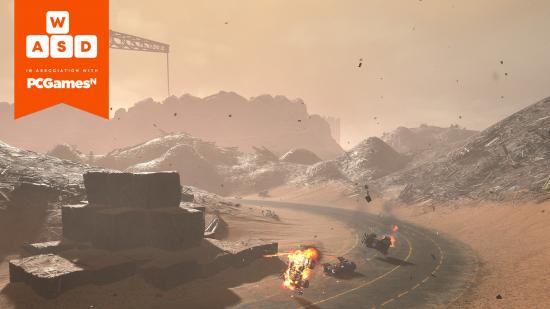As we grapple with the environmental impact of our favourite hobbies, we turn our attention to the increasingly important topic of sustainability. Ahead of its appearance at W.A.S.D., the consumer videogame show that'll let you get your hands on new and upcoming games, Auroch Digital shares the efforts it's making to fight climate change, why it's “getting scary, fast”, and how gamers like you can get involved.
Auroch Digital has the same organisational philosophies as the Sumo Group it's part of, creating a culture around going green. Founded in 2010 and known for games like NarcoGuerra, Dark Future: Blood Red States, and Mars Horizon, studio director Tomas Rawlings and junior business development associate Jess Rutland say that “we all need to care about climate change if we want a future that we can make games in,” especially considering “it's the main existential issue of our age.”
Temperatures are rising and look to have set a new world record of +38.5°C (+69.3°F) in Antarctica this month. While this spells an uncertain future, shattering ice shelves and melting caps will cause sea levels to rise, beaches to erode, and increased risks of flooding.
Auroch Digital is dedicating time and resources to “preserving wild space/creatures” in order to offset emissions, including taking part in the ‘Great North Bog’ project. This aims to restore peatlands in the north of England, as “healthy peatlands capture CO2 from the atmosphere through photosynthesis.”
The hows and whys get agriculturally technical, but Rawlings and Rutland explain that “because plants that grow on peatlands don’t fully decompose under wet conditions, they don’t release carbon that would otherwise be returned to the atmosphere as CO2. Draining the soil to allow for agriculture leads to the decomposition of the plants and soil shrinkage. Drying the soil allows shrubby vegetation to grow, making the land more vulnerable to wildfires, releasing yet more CO2. Healthy, wet peatlands slow the flow of water from the moor tops into rivers, reducing flood risk, and also provide an important wildlife habitat.”
It’s not all about offsetting emissions with external projects, though, as the developer believes “the main focus should be the initial reduction of carbon in the first place.” It starts in the office, as the team regularly “measures the energy used as a studio” so it becomes second nature to switch devices off when they’re not in use, saving electricity.
Getting the message to gamers is equally important, as the developer shines a spotlight on its reputation for linking real-world issues with games. “In Dark Future, we worked with scientists from The Wellcome Trust to embed good science about the impacts of climate change to human health,” Rawlings says. “Our work as game devs is a key way to talk to the issue, something we have many more plans for.”

The Sumo Group has pledged to go carbon-neutral by 2025 and has a new scheme called Climate Champions for active staff members, but you don’t need to be a developer to get involved. Auroch Digital urges you to “become a climate activist. Lobby for industries to change for the better, write to your MPs, join campaign groups, and seek renewable energy resources where possible.”
Change will happen through a combination of investment that leads to new technologies and politics. As Rawlings says, “while individual and company action helps create an environment where change can happen, ultimately the biggest lever of power for change (and that blocks change) is political. Those in power need to act, and understand that if they don’t, the people they govern will vote for others who will.”
You can find out more information through the Green Games Summit, Playing for the Planet, and attending W.A.S.D. at the Tobacco Docks in London from April 7-9, 2022. You can buy tickets for W.A.S.D here.

